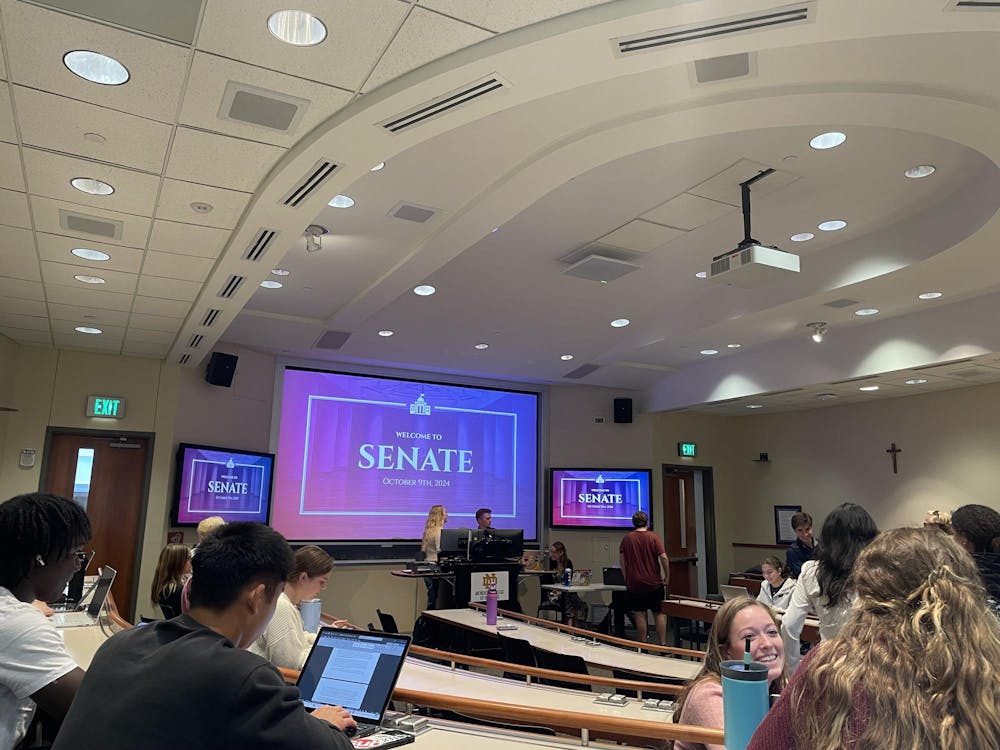The Notre Dame student senate met in Mendoza 161 Wednesday evening to discuss student union finances and confirm nominees for roles in student government.
Beginning the meeting, junior Maeve Miller, the student body vice president, announced that she, student body president senior Dawson Kiser and chief of staff senior Allison O’Connor would be giving a presentation to the University’s Board of Trustees Thursday on the theme of “belonging,” as prompted by the Division of Student Affairs.
Miller said the group intends to emphasize “shared experiences and shared spaces” to increase a sense of belonging on campus, particularly among minority students. She further explained the group will advocate for increasing the dining hall budget, allowing students to access more event spaces on campus and renovating the rest of the LaFortune Student Center. Part of the building was renovated a year ago, including the new diversity, equity and inclusion center, but plans remain in place to renovate the rest.
Following Miller’s explanation of the administration’s proposals to the Board of Trustees, both the financial management board and the club coordination council (CCC) gave presentations on the fiscal state of the student union.
First to present was assistant student union treasurer senior Mark Metryoos. Metryoos explained the student union is funded by three revenue streams: the student endowment, the revenue collected from sales of The Shirt and the $95 student activity fee, which is built into every student’s tuition and accounts for 74% of the funds.
CCC president senior Anna Teerlinck then expanded on the breakdown of the money received by the student union. She explained 59% of the funds go towards student union organizations, which include dorms, student government departments and student union board (SUB) events, 40% of the funds go towards student clubs and organizations, 0.75% of funds go to a collaboration fund and 0.25% of funds go toward special interest organizations.
Teerlinck said the CCC evaluates clubs’ funding requests by looking at the details of their costs and the amount of money they have fundraised.
“We demand the line item expenses so we can maximize our ability to come to you guys and [the] senate and confidently say we know where this money is going, and we're confident where this money is going,” Teerlinck said.
Teerlinck said 46.3% of clubs rely on student union funding every year. Although clubs requested $1.4 million in funding last year, the CCC was only able to distribute $384,000.
Some senators expressed concern that too much money was being spent on student union organizations, while not enough money was being spent on student clubs.
Judicial council president senior Hunter Brooke of Carroll Hall expressed support for the amount of money student union organizations receive.
“A large sum of money is allocated to the dorms directly and funds their signature events,” he noted. “I think people would say the overall impact is pretty significant, and I think dorms like signature events.”
Metryoos also noted the student union organizations encompass a wide range of groups, explicating the high percentage of the budget it takes up.
The senate is set to consider a resolution which would raise the student activity fee from $95 to $140 per year for each student. The resolution is sponsored by Brooke, Teerlinck and student union parliamentarian senior Thomas Musgrave.
Following the presentations and questioning on the student union’s fiscal status, the senate considered nominations for members of the judicial council’s election committee. The eleven nominees — junior Rex Burkman, freshman Aidan Cazalet, freshman Daniel D’Alessio, sophomore Peyton Davie, senior Charles Fink, freshman Leslie Guallpa, freshman Mackenzie Lopes, freshman Nia Maria, sophomore Zachary Mormino, junior Ryan Paillet and freshman Yijia Zhu — were nominated by Brooke and sophomore Madison Denchfield, vice president of elections for the judicial council. The nominees were confirmed unanimously and without debate.
In its final order of business, the senate then considered the nomination of senior Renee Aziz for the position of co-director of campus technology and innovation. Aziz was also confirmed unanimously and without debate.
Kiser said Aziz will help in the implementation of the Notre Dame mobile app and student government initiatives on artificial intelligence.
Following the confirmation of Aziz, the senate adjourned for the week.
Editor's note: A previous version of this article mistakenly stated that the CCC gave out $1.4 million in funding last year . The CCC distributed $384,000 in funding, while clubs requested $1.4 million.










